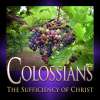
Sunday, May 01, 2011
by Robert Dean
Passage: Colossians 1:9-11
Series: Colossians (2011)
Duration: 53 mins 1 sec
Paul expresses four purposes for his prayers in these verses. The first two are related in an important way. The first purpose is that we might be filled with the knowledge of His will. The second is to walk worthy of the Lord. However, these are related in that we are to be filled with the knowledge of His will so that we may walk worthy. The knowledge of God's will is not an end in itself. It is related to the application of that will to our thinking and living. This is expressed through two key terms: wisdom and understanding. These words are often described in terms of the Greek connotation. However, Paul and the other apostles would not have thought of them in the Greek cultural sense, but in terms of the Hebrew meaning in the Old Testament. In this lesson we learn what the biblical or divine viewpoint of wisdom and understanding is.

Sunday, November 25, 2012
by Robert Dean
Passage: Colossians 3:20-21 & Ephesians 6:1-4
Series: Colossians (2011)
Duration: 51 mins 8 secs
The family is where the next generation is trained. Its health is related to the health of a society. Honoring parents shows humility and respect which is the essential response to authority. A leader must first learn to follow. Observe a child’s response to the parent of the opposite sex as an indicator of the way he will relate to his spouse. In Proverbs, verses concerning how to train children are practical guides of implementation. See the nature of Proverbs as wisdom sayings, not promises. Understand what it means to “train up a child” and when that begins. When is the “rod of correction” appropriate? What is the common starting point of every baby? Is discipline always negative? What is the direction of our culture regarding child rearing? How does discipline relate to God’s love for us? What was God’s ultimate expression of judicial punishment?